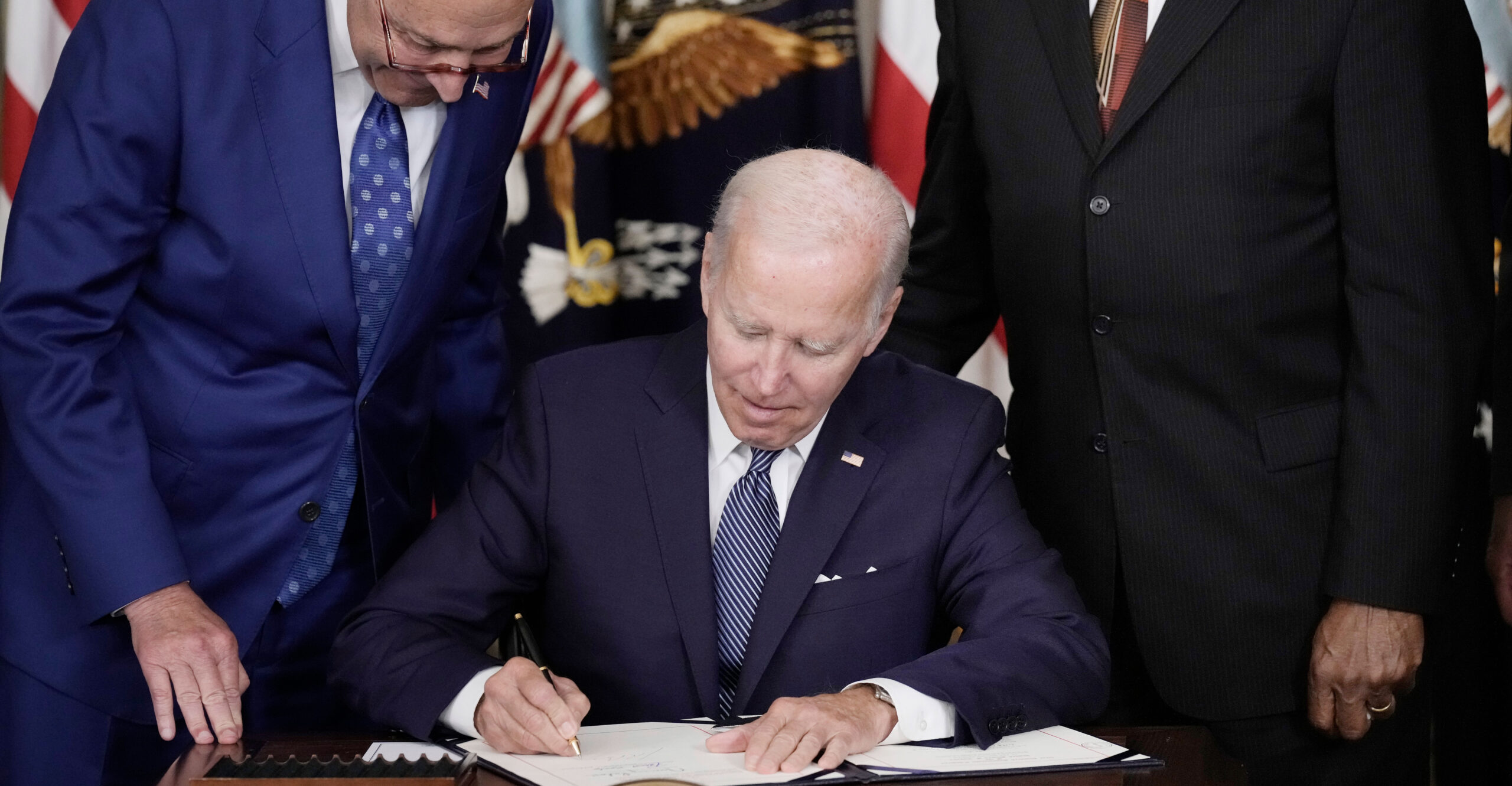Doc7505
Diamond Member
- Feb 16, 2016
- 15,718
- 27,674
- 2,430
Biden Raised Taxes, but Tax Revenues Are Way Down This Year. Here Are 5 Reasons Why.

5 Reasons Tax Revenues Are Way Down, Even Though Biden Hiked Taxes
In August 2022, President Joe Biden signed the misnamed Inflation Reduction Act, which hiked lots of taxes, yet tax revenues are way down.
ust because the government raises taxes, doesn’t necessarily mean it will raise more revenues. The Biden administration is discovering that the hard way.
In August 2022, President Joe Biden signed the misnamed Inflation Reduction Act into law, which included a new tax on companies’ financial statement income, new IRS funding to increase audits, an excise tax on stock buybacks, and more taxes on natural gas, oil, and coal. To top it off, certain Trump administration business tax cuts simultaneously have been phasing out.
On paper, that adds up to more than $60 billion in tax hikes in 2023.
Yet, as of July 31, tax revenues are down almost $400 billion from the same time last year, representing a 13% drop in tax receipts—even larger after accounting for inflation.
~Snip~
COMMENTARY BY

Preston Brashers@PrestonBrashers
Preston Brashers is a senior policy analyst focusing on tax policy at The Heritage Foundation.
Just because the government raises taxes, doesn’t necessarily mean it will raise more revenues. The Biden administration is discovering that the hard way.
In August 2022, President Joe Biden signed the misnamed Inflation Reduction Act into law, which included a new tax on companies’ financial statement income, new IRS funding to increase audits, an excise tax on stock buybacks, and more taxes on natural gas, oil, and coal. To top it off, certain Trump administration business tax cuts simultaneously have been phasing out.
On paper, that adds up to more than $60 billion in tax hikes in 2023.
Yet, as of July 31, tax revenues are down almost $400 billion from the same time last year, representing a 13% drop in tax receipts—even larger after accounting for inflation.
It’s unusual for tax revenues to drop from one year to the next, as it’s happened only eight times since 1960. And only once in that 63-year period—from 2008 to 2009—did revenues fall by more than 7%.
It’s too early to fully account for why tax revenues are down in 2023. However, there are some factors that are clearly at work, even if it’s unclear how much of the drop in tax receipts each factor explains.
The following are five such factors.
1) Slow Economic Growth
Economic growth has cooled substantially over the past year and a half, leading to stagnant real incomes, which in turn have diminished income-tax and payroll-tax receipts.It’s unusual for tax revenues to drop from one year to the next, as it’s happened only eight times since 1960. And only once in that 63-year period—from 2008 to 2009—did revenues fall by more than 7%.
2) Explosion of Green Tax Credits
The Inflation Reduction Act carved a large hole out of the tax base for the crony green economy. While green companies have long enjoyed generous tax treatment, the 2022 law took things to another level.
3) IRS Regulatory Activism
Part of the explosion of green tax credits was predictable. Some companies will chase government subsidies like children going after candy thrown at a parade.But the IRS and the Biden administration have also been playing fast and loose with regulatory interpretations of the new tax provisions. By devising expansive definitions for certain terms written in the statute, the IRS has greatly expanded the size of some of the green tax credits.
4) COVID-19-Era Employee Retention Credits
If you’ve listened to the radio, watched television, browsed the internet, or answered a call from an unknown telephone number in the past year or two, chances are you’ve come across marketing for the employee retention credit.5) Flaws in Budget-Scoring Process
The Joint Committee on Taxation and the Congressional Budget Office produce budget scores of significant tax and spending legislation. In theory, these agencies’ analyses should be tools that help lawmakers write fiscally responsible laws.But the budget models are far from perfect. Because they don’t account for economic growth, they’re biased against legislation that would grow the economy and in favor of spending bills that pay people not to work.
A Sea of Debt
Congress and the White House are spending at a breakneck pace, and now tax revenues have fallen significantly as generous tax credits and a slowing economy outweigh the revenues from Biden’s economically harmful new taxes.The net result is that Washington is burying Americans under a sea of debt.
In four short years, lawmakers have managed to add $80,000 of debt per U.S. household, and the budget picture looks much, much darker ahead.
Politicians’ gimmicks won’t change the fact that the American middle class will be the ones left to pay history’s largest tab, run up by D.C. lawmakers on your behalf.
Commentary:
Democrats screamed and cried claiming Trump`s tax cut was for the rich, yet the people prospered and tax revenue rose.
Joe and his merry DSA Democrats claimed they would only tax the rich but it fell on the working class and tax revenue has fallen because of higher taxes, inflationary practices and forcing the Green movement down the throats pf Americans.
This is coming from the same morons who think Biden is fit to serve a second term no matter what.
We are now in an undeclared recession. Heading into a deep depression.
DSA Democrats can move all the goal posts and change all the definitions they want, but it doesn’t and won`t change the outcome.
Two consecutive quarters of negative loss to GDP equals recession.
But have no fear
[B][I]Bidenomics[/I][/B] is here so they tell us.

:max_bytes(150000):strip_icc()/GettyImages-591478749-fb686ce4aa5c4dc1b2ef76949bb8ea81.jpg)